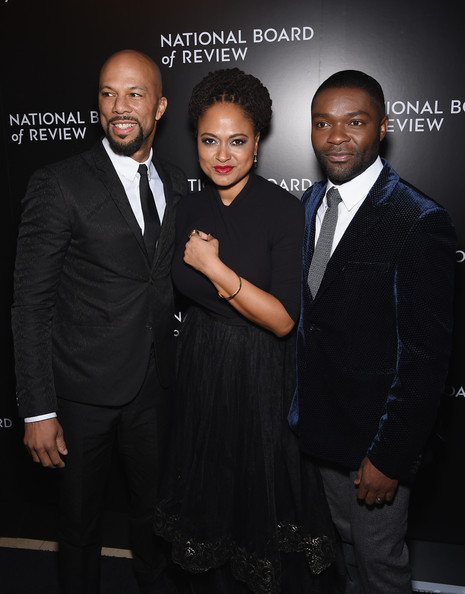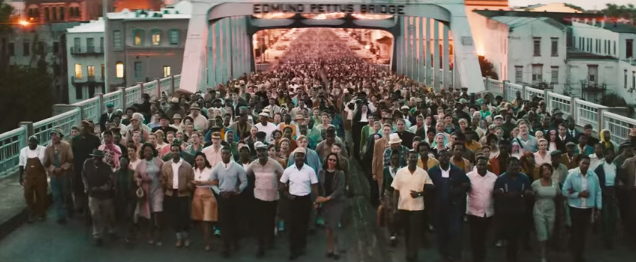Selma Luncheon was a "Glory"
 Wednesday, January 7, 2015 at 1:36PM
Wednesday, January 7, 2015 at 1:36PM In the last few days of Oscar voting (balloting ends tomorrow at 5 PM PST) campaigns have been running at full bore with events for numerous films ongoing here in NYC were TFE is based. None of them have been greater than the Selma luncheon yesterday which was a beauty from start to finish. The luminaries really turned out for this one: several former Oscar nominees and winners, famous TV journalists, and Harry Belafonte himself, who we recently honored here to coincide with his Jean Hersholt Huminatarian Award and who was so instrumental in the events of Selma and the Civil Rights movement of the 1960s.
 Common, Ava DuVernay, and David Oyelowo at the NBR gala later that evening
Common, Ava DuVernay, and David Oyelowo at the NBR gala later that evening
I worried at first during the opening speech (my apologies but I forget the name of the man who introduced the event) that the righteous politics and the "importance" button were being pushed with too much force. I should explain: Selma is indeed tremendously important and a political drama. But it's also an extremely good movie and, all too often, the quality of actual movies, gets lost in the Oscar race. Which is to say that a movies execution, and not its concept of subject matter, is what awards should be based on. Anybody can address an important topic or theme or historical event, only visionary talented artists can render it as beautifully and potently as Ava DuVernay has.
My worries were unfounded. Soon all hint of stridency disappeared once the filmmaking team was speaking and humor, humility, tenderness, empathy, universality were also flooding the room. David Oyelowo, interviewed by Oprah's bestie Gale, told a wonderfully moving and funny story wherein he imitated his father's heavy Nigerian accent and shock and glee reacting to Brad Pitt's recent sing-a-long of "Oyelowo"
Our name is on the map now!
...and also his father's reaction to him playing the King of England on stage. His father had moved to the UK decades earlier when racism was prevalent.
I cannot believe that they let a black man play the Kind of England. And that black man is my son.
Recent attacks on Selma's accuracy were addressed both subtly and pointedly. Famous former New York Times reporter Gay Talese, who turns 83 next month, was interviewed about his first screening of the film. He had reported from Selma during the mayhem of that "Bloody Sunday" that is so horrifically dramatized in the film. He admitted that he had sat down to screen the film with considerable skepticism and was stunned that this woman who wasn't even there had captured it just as he remembered it. He urged those who were interested to watch the actual footage that the networks displayed in a moment that he said changed journalism and the country forever.
I loved Ava DuVernay, opening speech.
If you believe in justice and dignity our effort is you. What we tried to do is deconstruct heroes. No one is all saint. No one is all sinner. There are grey areas inbetween: it's called being a human being. And so what we try to do is unencase people from marble, take them out of the pages of a history book, allow them to breathe and become complex. For us to question who they are debate who tehy are. That was our intention and in doing so illuminate this beautiful time, a time that really changed this country. The fact that we can all be in this room together, celebrating as we are as equals, is the direct result of the events we chronicle.
She also addressed, with some noticeable sadness, the complaints that she had not depicted LBJ correctly and reminded people that it's a distraction from the resonance of the film: that LBJ's great legacy, the Civil Rights Voting Act has recently been dismantled. That's what people should be angry about.

But for all the fine speeches, the highlight of the event was most definitely a live performance of the Original Song contender "Glory". Common's humble opening speech set the inspiring tone. His stillness and hand gestures as he rapped with John Legend's passionate piano and voice on the chorus combined with the sonic depth that the back-up singers and strings behind them supplied made for an exquisite if ultra-short concert (just one song!).
I recorded it for you and saved it at the highest quality my phone could handle and you can listen right here. Common's speech is the first two minutes. The song begins thereafter. This won't approximate how moving it was to be there (it's only the third time they've performed the song live) but the song is too beautiful not to share.



Reader Comments (10)
Thanks!
(Wish I coulda been there like at AFI.) ;-)
I can understand a little how it felt for you to be in the presence of those who made this powerful movie. If there ever was a movie in which you can feel the love and complete sense of importance in its making, Selma was it. It was noted in the podcast and I think one of the reasons is that many of the characters who could potentially have a storyline don't and for once that is a good thing, because it heightens the sense of community and makes us really familiar with each and every one of the 20+ faces that are always on the screen. I thought everything was handled with such grace and loved how it really paid respect to Jimmy Lee Jackson's memory (Keith Stenfield was really something). Just being in the movie theater with strangers is such a thrilling experience, let alone with those who participated in the real events or in the making of this movie... Selma is the most important American movie of 2014 and also one of the best.
Can't get over the fact they're trying to rewrite history with how they've written LBJ. Listen to his audio tapes and you'll see the man he really was, not how he was portrayed in Selma.
Ava Duvernay's "this is how I view history" was just baffling as well seeing how she's usually so well spoken,
I love this song. And, superficial comment, but I David Oyelowo is WEARING that suit jacket.
I am so in awe of Ava DuVernay's grace. This was a fabulous read-- I feel like I was there in the room. THANK YOU for posting this track, I had non-stop chills listening.
@Howie, then I assume you were also outraged at the historical accuracies in Argo, American Sniper, Lincoln and countless other films that didn't get nearly as much shit as DuVernay is unfairly getting for her film?
I agree with Jase's major point that the degree of historical accuracy scrutiny is selective (e.g. BP winner Braveheart), but I have to disagree with him specifically regarding Lincoln.
That movie caught a lot of flack for its inaccuracies, Some BS about the votes from the state of Connecticut, the fact that Lincoln was not lying across the bed after shot (he was too tall to fit the bed properly), the degree of insanity of Mary Todd Lincoln and much more. In the end it cost Tony Kushner's his deserved screenplay Oscar.
The irony, of course, was that the screenwriter for Argo, a very inaccurate movie, especially that moronic third act with the Americans speaking Farsi to the Iranian authorities and being chased down at the airport, won instead. They were originally criticized for the portrayal of the Canadians' contribution, way back in their festival debut, added a title card to the end of the movie to make amends, and that plus the #poorBen narrative were enough to get the movie a pass! Sigh! =/
I'm not sure why critics are so quick to run with DuVernay's "vividly bringing history alive/not just a standard biopic" spin when that's what every director tells us about their biopic projects. We seem to be giving her more than the benefit of the doubt about how dynamic and unusual Selma is when it's really no different than other movies in that genre.
Hayden -- that would imply that it's not significantly more intelligent and much broader in its reach (not really a bio of MLK jr but a study of a movement) than most bios which would be a very false implication.
I agree with Hayden. Though I was less bothered by the historical inaccuracies (which, ya know, happen in Hollywood films - this ain't a new phenomenon, folks) than the overall derivative feel of "Selma"...there were a legion of scenes that I felt like I've seen better depicted previously in television and film: from Malcolm X to Boycott to Path to War to Wallace to even The Butler, none of which focuses exclusively on "Selma", but feature scenes and performances which addressed it (or included characters or events that were related to it). For example, the scene between Wallace and LBJ felt like a DIRECT rip from Path to War and Wallace...and those scenes were written and acted better (they were also probably assisted by context, as they delved more thoroughly into the politics of the day, as well as provided a more nuanced take on both men). DuVernay's film feels most confident (and fresh) in the earlier scenes between Martin and Corretta...between Martin and the SNCC leaders...between Martin and LBJ (explaining the need for a Voting Rights Act)....it lags, strangely, when it speechifies...when it marches...when it vilifies...and when it commentates..I should add that as a black man, I've grown increasingly bored with Hollywood's "black movie" subject rigidity. In other words, all black casts can't get an important film greenlit (or recognized by awards bodies) unless their central focus is on slavery, civil rights, or the race of the characters. "Selma" is an okay movie that feels like its being bolstered by guilty white liberals who feel both reticent about criticizing the film because of its subject and self-fulfillment because they're bolstering an "important" black movie in an otherwise wholly whitewashed awards circuit (only one, though, when's the last time we had two or more black led films seriously competing in the season?)....long rant but I've grown slightly annoyed. Lol